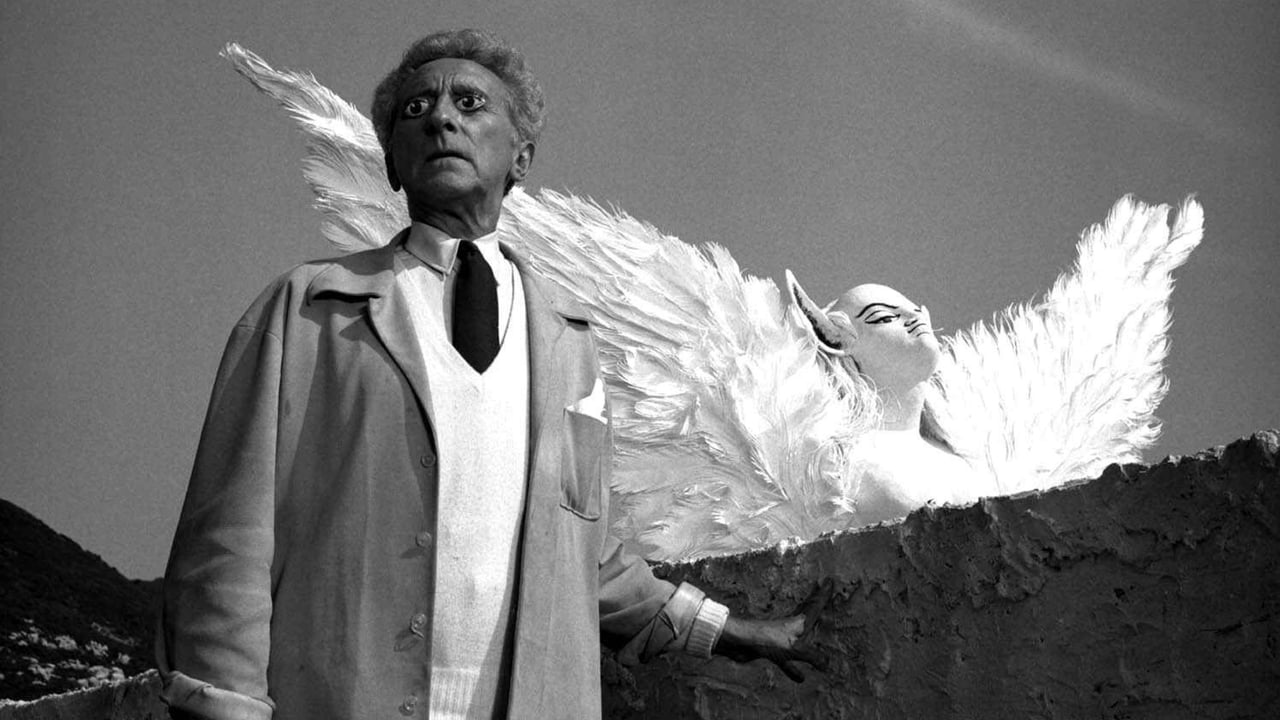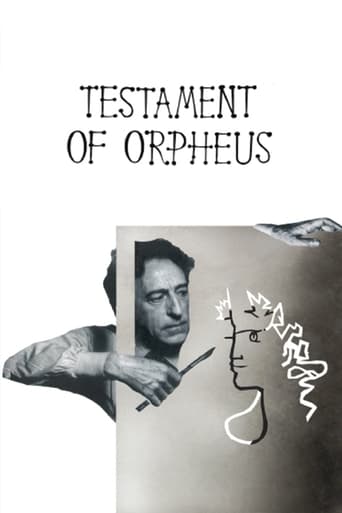

Ever since I first saw Orphee decades ago I thought it one of world cinema's Greats, a work of Art and underplayed panache that literally transcends Time. That was Part 2 of Jean Cocteau's Orpheus cycle in 1949 – in 1932 Part 1 Le Sang D'un Poete set the scene in a whimsical primitive way, and Testament was the convoluted Part 3 which became his final film released in 1960. First thing – if you enjoyed Orphee I recommend not watching this immediately afterwards, it's a contrast between gold and brass. Second thing - if you don't like pretentious art films this is a special case, it's still by far the best pretentious film I've ever seen and worth watching for its self-confidence. If you do like pretentious art films then to come clean I'm one of the denser people so disparaged by the previous exalted commenter therefore I have nothing I can impart to you. I've always considered this only as Cocteau's Testament – it's all about him and his thoughts of posterity at 70.Cocteau as film maker and poet stands between two worlds accused of being guilty of Innocence and is condemned to Life while his last film makes itself around him. There's a lot more to it, involving going backwards forwards and sideways in Time and Timelessness with or without trick photography, all of the cast large or small spouting cod-heavy aphorisms with gossamer realism or relevance. It gave him a chance to revisit the subject, and as he admitted at the end of the film to give some of his old friends (Casares, Perier, Dermithe etc) a job in the revisiting – after all, he was by now to use his own words from Orphee now "rotten with success" and could get away with murder. He died twice in here – even the Motorcyclists Of Death only wanted his autograph - and he lived and died to tell the tale. I can see where Banksy got his inspiration for his recent Mobile Phone Lovers from. I take away the image of Cegeste's image being saved from backward burning only for the image to be torn to pieces, that cerebral scene was worth the eighty minutes! The twenty minute wordy trial scene gets tiresome as you gradually realise its pointlessness apart from the padding out of the temporal running time. But there's plenty of tremendous imagery and heavy moralising throughout; Cocteau was incredibly talented, big on surrealism the occult and symbolism of all kinds, all more or less intellectual dead ends and as with many other big thinkers full of mumbo jumbo before and since he agonised over the merits and demerits of the Catholic Church, another dead end. Whereas with Orphee he made a film that could be enjoyed over the generations by all kinds of people with various levels of brainpower he created here a film so obscure it only plays like an in-joke raspberry to the world of the end of his life.So there you are – I do quite like Le Testament D'Orphee so hopefully Cocteau won't be sad wherever he is, it's just I'm not a poet and have an old nose for Art and Artifice. No matter how unique or interesting this film is to me or even for that matter to those of a higher intellect, he was simply having a laugh.
... View MoreThis motion picture is remarkable, in it's grandest statement. I won't say much, although if you look into a particular character in the opening sequence, "Professor Langevin" he is a real person in history. A French Physicist, http://en.wikipedia.org/wiki/Paul_LangevinMonsieur Langevin is what I name, the French "Einstein". But, in my opinion far more complex and advanced lifeform. If you, do a google search for "Langevin & Einstein" in google images, you can find a famous photo where the two minds collided.So, what is the mystery behind this character? Or rather the secret? It is very groundbreaking, Jean Cocteau's genuine testament on distorting reality, not here in the present day, but rather since in the movie he is a time traveler, the Future, where the Professor awakens from his dream. He calls it a magic bullet. And that is what it is...This is one of cinema's finest magical pieces, in that there's a mysterious distortion in reality, in the Future. Look into it, you may think that, all this are just assumptions, but, remember Langevin is a real human like you and me.So, what we believe as surreal, may not be actually surreal at all, rather the opposite, a genuine reality that happened to be in a theatrical production, a fantasy. Being that, is why we call it surreal. I would say, Cocteau's surrealism is heightened best in this masterpiece.Enjoy.
... View MoreOne can view this movie, and find themselves asking themselves by the end, what did they watch? The movie has very confusing that tossed all logic out of the window. One might think it's a continue story of Orpheus (1950) with the opening scenes, but the series of symbolic encounters and surreal images more resembles The Blood of a Poet (1930). This movie might be considered the final part of the Orphic Trilogy, but it's just a film that is a petrified fountain of thought, in my opinion. In his last film, legendary poet/film maker Jean Cocteau portrays an 18th century poet who travels through time on a quest for divine wisdom while seeing his past work come back alive due to his inspirations and obsessions with them. Cocteau's persona is unstuck in time, and materializes in and out to episodically interact with various characters such as two judges who essentially put Cocteau's life on trial, some mimes dressed like horses, a camp of gypsies and a professor who apparently enabled this time travel through inventing a bullet which flies faster than light. In the opening narration, Cocteau alternatingly calls the movie "a striptease show where I take off my body to reveal my soul" and "a poet's legacy to the youth which has always supported him." Testament of Orpheus brings full circle the journey Cocteau began in The Blood of a Poet, an exploration of the torturous relationship between the artist and his creations. In a mysterious wasteland, he meets several symbolic phantoms that bring about his death and resurrection. In the end, the film is mostly a tribute to himself and him looking back at his work before accepting his death. Too bad, the movie doesn't truly show that. Instead, the audience gets an phantasmagorical whirl of imagery, tragedy and an enormous, transcendent sense of wonder. The movie works as an art surreal film, as the movie goes from one dream sequence to another. The film use great work of imagery. Mirrors, horses, flowers, tapestries, are used to represent Cocteau's past. His special effects and camera tricks are always a highlight of his work, as he sees slow motion walk scenes, and selective color. My favorite is the backwards-motion. A great example of this is how the punctured, smoke-filled balloon reassembles or a burned photograph is restored. Others are an erased blackboard sketch reappears. A draped sheet flies upward. Cegeste jumps out of the ocean, perfectly groomed. And the lengthiest example is the meticulous repair of a torn-up hibiscus flower. Check them out, it's probably the best high lights of the film. The film was shot on location at Les Baux in the South of France and it's beautiful. The movie also host a few famous cameos such as Pablo Picasso, Jean-Pierre Leáud, Jean Marais and Yul Brynner. The music is charming. Most of the film is Handel. Concerto in A minor, Op.6. While it's the best of the trio, it's nowhere near a good film. It's a bit pretentious, stiffly acted and cinematically dated. His lack of writing skills can be seen in this undeniably dreadful screenplay, loaded with the most clichéd statements about poetry and art, and the most trite and incongruous imagery imaginable. The scenes with a man walking about with a fake horses head might be a bit silly today. By contrast, Cocteau's symbolism is so heavy-handed, so obvious, and so manifold that they have little real-world referents so they can be hardly understood by the average viewer. The scene with the faster than light bullets is weird science, Cocteau brings them into the past so the professor can shoot him, thus sending him back in time. How all that works is left unexplained. In a way, the movie is full of mixed imagery that rarely makes any sense to anybody, but Cocteau himself. In the end, Cocteau, the poet movie maker, nobody has reached higher doing poetry with images. Nobody. Rather than being a complete ego trip, it is closer to what Fellini did in "8 1/2", a similar work of genius, where the soul is searched, a document is made with all the art and craft the director can bring, and doesn't matter if the audience get it or not. Once Cocteau vanishes for the last time, the film ends. "If you didn't like it, I'm sorry," he humbly adds. Check it out if you're a huge Cocteau fan, if not, research more about him before watching this film.
... View MoreWhen this movie starts out, you will find yourself - if you are old enough - feeling that you have somehow been transported back in time to the 1950s and some very serious coffee house (NOT Starbucks) where, on Friday nights, they showed "experimental" films (not movies, of course, but films). The surrealist tricks that had been innovative 30 years before in "The Blood of the Poet" are still there, with the people and objects that suddenly disappear or appear and the surreal movement. There is still the clearly enunciated and theatrical speech. By the 1960s, this could be seen as kitsch.But there is still, fairly often, a certain imaginative touch that comes off as real poetry. Not as much as in "Beauty and the Beast", certainly, to which this is much inferior. But enough to justify giving it a try.And then there is the cameo appearance by Yul Brenner, who actually speaks very good French. Brenner was a big star at the time; how Cocteau convinced him to appear in this I will never know.
... View More